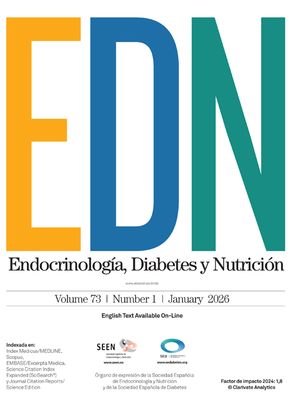A 32-year-old female with a history of morbid obesity and liver steatosis underwent Roux-en-Y gastric bypass surgery using a laparoscopic approach (a feeding loop of 150cm and a biliary loop of 100cm). The patient's measurements before surgery were 114kg in weight, 1.60m in height, a BMI of 44.5kg/m2, and a waist circumference of 120cm. There were no nutritional deficiencies before surgery. Six weeks after surgery, the patient had lost 17.7kg (31% of excess weight), was adhering to a diet, and taking daily a multivitamin preparation. Laboratory test results included: prealbumin, 13mg/dL (20–40); retinol binding protein (RBP), 1.71mg/dL (3–6); vitamin A 0.16mg/L (0,3–1); vitamin A/RBP, 0.68mg/g (0.8–1.2); albumin and all other nutritional parameters were within the normal ranges. The patient was instructed to continue taking the multivitamin preparation, and a vitamin A supplement was added (50,000IU daily). After three months she had lost 60% of excess weight and had a vitamin A level of 0.28mg/L and a vitamin A/RBP level of 1.1mg/g, and treatment was maintained as before. Six months after surgery, the patient attended the emergency room reporting the sudden appearance of an orange pigmentation in the palm of one hand (Fig. 1). She also reported alopecia, irritability, asthenia, and loss of appetite. She had no vision changes or gastrointestinal symptoms. Liver damage was ruled out, and the vitamin A dose was reduced to 50,000IU every other day. One month later, the patient reported clinical improvement and the gradual disappearance of skin pigmentation. Laboratory test results included: prealbumin, 16.2mg/dL; RBP, 2mg/dL; vitamin A, 0.27mg/L; and vitamin A/RBP, 0.9mg/g, with no changes in the other variables. The condition was attributed to hypercarotinemia secondary to vitamin A treatment, and supplementation was adjusted to 50,000IU two days weekly. With this dose, vitamin A remained within normal limits, with no associated manifestations.
Vitamin A is a lipid soluble vitamin involved in the formation and maintenance of epithelial cells, bone growth, visual acuity, the immune system, reproduction, and iron utilization.
The vitamin A complex includes retinoids, beta-carotenes, and carotenoids. It is postulated that 90% of vitamin A reserves are in the liver, which secretes the vitamin as retinol. Retinol has to bind to RBP and transthyretin to form the complex required for interaction with specific cell surface receptors. In addition, RBP synthesis in the liver requires an adequate amount of protein. Thus, serum retinol levels may be affected by protein deficiency.
A 12.5% vitamin A deficiency has been reported before bariatric surgery,1 and is explained by an increased consumption of food with high energy density and poor in vitamins and minerals, and by the non-alcoholic steatohepatitis often associated in these patients.2 On the other hand, a chronic decrease in carotenoid levels has been documented in 25–56.8% of patients after Roux-en-Y gastric bypass (RYBG) and in up to 60–70% after biliopancreatic diversion (BPD),3 although the prevalence of these conditions is highly variable in the different studies. Brolin et al. reported a 10% deficiency at 4 years of RYGB,4 while Pereira et al. detected deficiency in 50.8% and 52.9% of patients 30 and 180 days after RYGB respectively.5 Malabsorption secondary to the exclusion of some gastrointestinal segments, decreased intake, and intolerance of certain foods, including fat and other vitamin A sources, may be some of the reasons explaining this deficiency.6
On the other hand, most reports published provide vitamin A levels as absolute values, rather than as being adjusted for protein. After bariatric surgery, various conditions may cause decreased protein levels, including malnutrition, intercurrent diseases, infections, prolonged fasting, or chronic diarrhea.7 Therefore, if albumin, prealbumin, or RBP levels are decreased, retinol levels may be misinterpreted as falsely low, which will result in overdosage and an increased toxicity risk.8 Thus, in order to better estimate the levels of vitamin A, we recommend the measurement of the levels of its transport proteins (RBP and prealbumin) and the calculation of the vitamin A (retinol)/RBP or vitamin A/prealbumin ratios.9 In addition, each laboratory should establish its normal ranges for these ratios for a greater accuracy in the definition of vitamin A deficiency,9 thus preventing symptoms due to inadequate supplementation with high doses of the vitamin.
It is well known that chronic vitamin A administration may cause toxicity.7 In the reported case, the patient reported irritability, anorexia, alopecia, and hypercarotinemia, reversible after a reduction in the vitamin A dose. Carotinemia is characterized by a yellowish pigmentation of the skin secondary to increased beta-carotene levels. Pigmentation usually occurs in the palms, plants, and skin folds, spares the conjunctiva, and gradually disappears at 4–6 weeks after the reduction of exogenous provision.
Despite the variability in the data available, and in the absence of standardized recommendations, dietary provision and supplementation with a daily administration of a multivitamin preparation (approximately 800μg) may be sufficient to prevent vitamin A deficiency after bariatric surgery.8 However, different recommendations have been issued to prevent and treat vitamin A deficiency. Some authors recommend a preventive supplementation with 50,000IU/day after malabsorptive procedures, while others recommend doses of 50,000IU, once daily at the start and then twice weekly, to treat deficiency. Higher doses are required if associated corneal changes are found.10 However, there is no agreement as to the dose and scheme of supplementation required, and prospective studies are needed to clarify these issues.
To sum up, because of the potential occurrence of vitamin A deficiency after bariatric surgery, these patients require close monitoring and individual prescription of the most adequate supplementation depending on the surgical procedure used to prevent and treat the deficiency, and to avoid potential overdosage.
Conflicts of interestThe authors state that they have no conflicts of interest.
Please cite this article as: Gutiérrez-Medina S, Iglesias Bolaños P, Paniagua Ruíz A, Martínez-Barbeíto MB, Bartolomé Hernández L. Hipercarotinemia tras cirugía bariátrica. Endocrinol Nutr. 2016;63:43–44.






